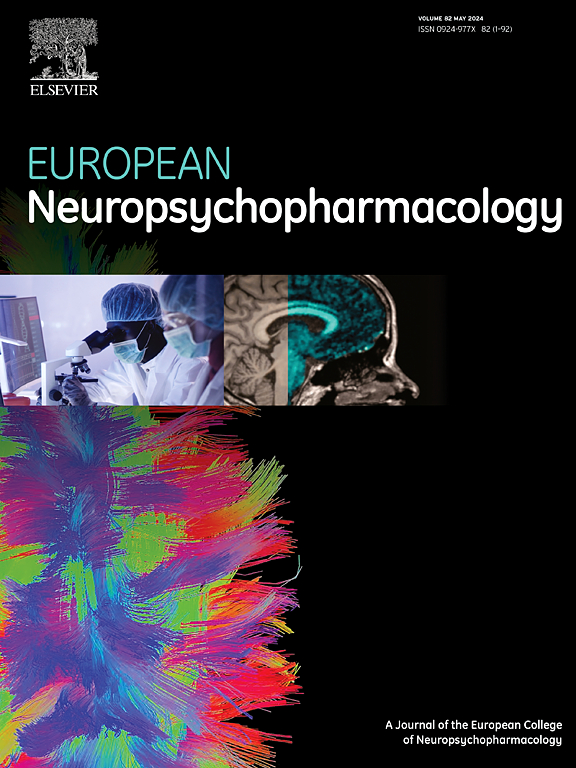了解遗传对终生精神障碍影响的方法
IF 6.7
2区 医学
Q1 CLINICAL NEUROLOGY
引用次数: 0
摘要
在精神障碍的遗传学方面已经取得了重大进展,导致关键基因组位点的鉴定,加强了对因果途径的理解,并扩大了药物靶点的范围。这些研究大多是基于横断面研究,忽略了精神障碍不是静态的,它可以在整个生命过程中发生变化。现在新出现的证据表明,像抑郁症这样的精神障碍可能会产生特定时间的遗传效应,影响精神障碍的发病、病程和持续时间。然而,现有的方法来推动这项研究的进展很少被应用于遗传和生命过程的研究。在本次研讨会上,我们将重点介绍令人兴奋的新方法,这些方法展示了基因组和生命过程方法相结合的效用,以提高对精神障碍的理解。这种新方法、遗传学和生命历程数据的整合可以揭示遗传和环境因素何时产生最大影响,从而可以更好地预防和干预精神障碍。Pravesh Parekh (Oslo)将介绍快速有效的混合效应算法(FEMA),这是一种用于执行大规模纵向GWAS的新型混合建模框架,允许发现snp的非线性相互作用,同时允许时变遗传力和随机效应。将介绍FEMA的关键方法论概念,以及挪威母亲,父亲和儿童队列研究(MoBa)和青少年大脑认知发展(ABCD)研究中精神障碍的新机会和应用。Esme Elsden(爱丁堡)将介绍抑郁症状的纵向表型及其在PRS预测和GWAS中的应用。使用来自UK Biobank的数据,可以推导出抑郁症状的轨迹,这些轨迹揭示了横断面方法遗漏的关键特征,这些关键特征包括暴露于抑郁症状的累积总量(曲线下面积)。结果表明,多基因的贡献显著影响整个生命过程中抑郁轨迹的严重程度和进程,这些特征的GWAS也确定了新的位点,可以通过纵向设计更有效地捕获。克里斯·雷纳(伦敦国王学院)将演示使用同时校正的经验贝叶斯估计(SCEBE)对MoBa母亲的抑郁症状进行重复测量的GWAS。GWAS和多基因评分的重复测量方法将与传统的终生史方法进行比较。选择性参与和损耗对重复测量分析的影响也将被讨论。Christel Middeldorp(阿姆斯特丹)将专注于持久的心理健康(EMH),一种稳定的心理健康状态。先前对有效市场假说的研究主要集中在心理健康问题的缺失上,而忽视了同样重要的幸福感维度。在本研究中,将通过对双胞胎进行纵向数据测量,来检验没有心理健康问题和随着时间的推移存在更高的幸福感。EMH的遗传性将被展示,并与多基因得分以及其他变量(包括受教育程度、人格特征、社会变量)的关联。罗宾·伍顿(布里斯托尔)将总结这些研究,并就生命过程和基因研究应该做些什么来促进未来的工作进行讨论。披露:没有什么可披露的。(邝、派瑞、伍顿)本文章由计算机程序翻译,如有差异,请以英文原文为准。
METHODS FOR UNDERSTANDING GENETIC CONTRIBUTIONS TO LIFECOURSE MENTAL DISORDERS
There has been substantial progress into the genetics of mental disorders, leading to the identification of key genomic loci, enhanced understanding of causal pathways and improved scope for drug targets. Much of this is based on cross-sectional work, ignoring the fact that mental disorders are not static and can change across the lifecourse. Emerging evidence now suggests that mental disorders, like depression, can have time specific genetic effects that influence the onset, course and persistence of mental disorders over time. However, the methods available to drive this research forward have rarely been applied to genetic and lifecourse studies.
In this symposium, we will highlight exciting new methods that demonstrate the utility of combining genomic and lifecourse methods for improved understanding of mental disorders. This integration of new methods, genetics and lifecourse data could shed light on when genetic and environmental factors are having their greatest effect, which could in turn lead to better preventions and interventions for mental disorders.
Pravesh Parekh (Oslo) will introduce the Fast and Efficient Mixed Effects Algorithm (FEMA), a novel mixed-modelling framework for performing large-scale longitudinal GWAS that allows discovery of non-linear interaction of SNPs, while allowing for time-varying heritability and random effects. The key methodological concepts of FEMA will be introduced, alongside novel opportunities and applications to mental disorders in the Norwegian Mother, Father and Child Cohort Study (MoBa) and Adolescent Brain Cognitive Development (ABCD) Study.
Esme Elsden (Edinburgh) will present longitudinal phenotyping of depressive symptoms and its applications to PRS prediction and GWAS. Using data from UK Biobank, trajectories of depressive symptoms can be derived which reveal key features that cross-sectional approaches miss. These key features include the cumulative total of exposure to depressive symptoms (Area Under the Curve). Results indicate that polygenic contributions significantly influence the severity and course of depression trajectories across the lifecourse and GWAS of these features also identify novel loci that can be more effectively captured through longitudinal designs.
Chris Rayner (King’s College London) will demonstrate the use of Empirical Bayes Estimates with Simultaneous Correction (SCEBE) for performing repeated measures GWAS of depression symptoms in mothers from MoBa. Repeated measures approaches to GWAS and polygenic scoring will be compared with traditional lifetime history approaches. The impacts of selective participation and attrition on repeated measures analyses will also be discussed.
Christel Middeldorp (Amsterdam) will focus on enduring mental health (EMH), a stable state of mental health over time. Previous research on EMH has primarily focused on the absence of mental health problems, neglecting the equally important dimension of presence of wellbeing. In this study, both the absence of mental health problems and the presence of higher wellbeing over time will be examined by using longitudinal data measured in twins, The heritability of EMH will be presented and the associations with polygenic scores as well as other variables, including educational attainment, personality traits, social variables.
Robyn Wootton (Bristol) will summarise these studies and provide a discussion on what lifecourse and genetic studies should do to facilitate future work.
Disclosure: Nothing to disclose. (Kwong, Parekh, Wootton)
求助全文
通过发布文献求助,成功后即可免费获取论文全文。
去求助
来源期刊

European Neuropsychopharmacology
医学-精神病学
CiteScore
10.30
自引率
5.40%
发文量
730
审稿时长
41 days
期刊介绍:
European Neuropsychopharmacology is the official publication of the European College of Neuropsychopharmacology (ECNP). In accordance with the mission of the College, the journal focuses on clinical and basic science contributions that advance our understanding of brain function and human behaviour and enable translation into improved treatments and enhanced public health impact in psychiatry. Recent years have been characterized by exciting advances in basic knowledge and available experimental techniques in neuroscience and genomics. However, clinical translation of these findings has not been as rapid. The journal aims to narrow this gap by promoting findings that are expected to have a major impact on both our understanding of the biological bases of mental disorders and the development and improvement of treatments, ideally paving the way for prevention and recovery.
 求助内容:
求助内容: 应助结果提醒方式:
应助结果提醒方式:


